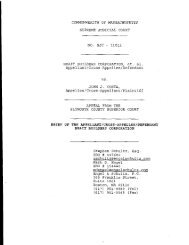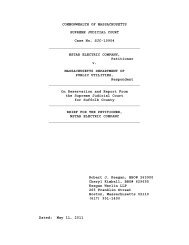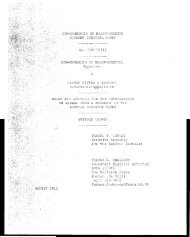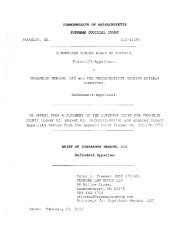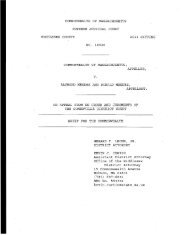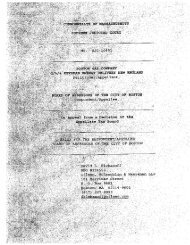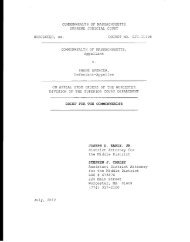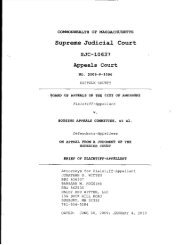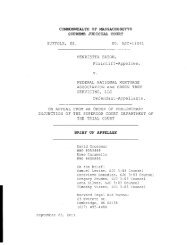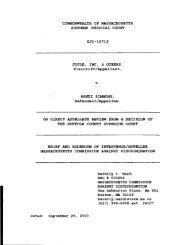462 Mass. 1 Appellant Ray Brief - Mass Cases
462 Mass. 1 Appellant Ray Brief - Mass Cases
462 Mass. 1 Appellant Ray Brief - Mass Cases
You also want an ePaper? Increase the reach of your titles
YUMPU automatically turns print PDFs into web optimized ePapers that Google loves.
COMMONWEALTH OF MASSACHUSETTS<br />
SUPREME JUDICIAL COURT<br />
SUFFOLK COUNTY NO. SJC-11156<br />
MICHAEL RAY<br />
v.<br />
COMMONWEALTH<br />
BRIEF AND RECORD APPENDIX FOR THE DEFENDANT<br />
ON RESERVATION AND REPORT BY THE SINGLE JUSTICE<br />
March, 2012.<br />
ANNE ROUSSEVE<br />
BBO #666395<br />
ATTORNEY FOR DEFENDANT<br />
COMMITTEE FOR PUBLIC COUNSEL SERVICES<br />
Public Defender Division<br />
One Congress Street, Suite 102<br />
Boston, <strong>Mass</strong>achusetts 02114<br />
(617) 209-5500<br />
arousseve@publiccounsel.net
-i-<br />
TABLE OF CONTENTS<br />
TABLE OF AUTHORITIES ............................. ii<br />
ISSUE PRESENTED. . . . . . . . . . . . . . . . . . . . . . . . . . . . . . . . . . 1<br />
STATEMENT OF THE CASE AND FACTS .................. 1<br />
ARGUMENT<br />
THE INDICTMENTS MUST BE DISMISSED<br />
ON DOUBLE JEOPARDY GROUNDS BECAUSE<br />
THE JUDGE DECLARED THE JURY TO BE<br />
DEADLOCKED AND TERMINATED THE TRIAL<br />
OVER THE DEFENDANT'S OBJECTION WHEN<br />
THERE WAS NO "MANIFEST NECESSITY"<br />
TO DO SO .......... -. . . . . . . . . . . . . . . . . . . . . . . . . . 4<br />
A. Introduction. . . . . . . . . . . . . . . . . . . . . . . . . . . 4<br />
B. There was no "manifest necessity"<br />
for the mistrial because the<br />
judge failed to ascertain if<br />
there was a reasonable probability<br />
of a unanimous verdict prior to<br />
declaring a mistrial ................... 5<br />
C. The judge's decision to declare<br />
a mistrial is not entitled to<br />
deference.on appeal because the<br />
judge did not give careful consideration<br />
to the available alternatives<br />
and the defendant's<br />
interest in retaining the chosen<br />
.i.Y.£y. . . . . . . . . . . . . . . . . . . . . . . . . . . . . . . . . . . 8<br />
CONCLUSION ....................................... 14<br />
ADDENDUM ......................................... 16<br />
CERTIFICATE OF COMPLIANCE ........................ 18<br />
RECORD APPENDIX .................................. 19
-ii-<br />
TABLE OF AUTHORITIES<br />
<strong>Cases</strong><br />
A Juvenile v. Commonwealth,<br />
3 9 2 Mas s . 5 2 ( 1 9 8 4 ) . . . . . . . . . . . . . . . . . . . . . . . . . . . . 7 , 1 0<br />
Arizona v. Washington,<br />
434 u.s. 497 (1978) ............................ 8, 14<br />
Barton v. Commonwealth,<br />
3 8 5 <strong>Mass</strong> . 517 ( 19 8 2) . . . . . . . . . . . . . . . . . . . . . . . . . . . 9, 14<br />
Benton v. Maryland,<br />
395 u.s. 784 (1969) ............................ 5<br />
Collins v. Commonwealth,<br />
412 <strong>Mass</strong> . 3 4 9 ( 19 9 2) ........................... 14<br />
Commonwealth v. Andrews,<br />
4 0 3 Mas s . 4 4 1 ( 1 9 8 8 ) . . . . . . . . . . . . . . . . . . . . . . . . . . . 5<br />
Commonwealth v. Haley,<br />
4 13 Mas s . 7 7 0 ( 1 9 9 2 ) . . . . . . . . . . . . . . . . . . . . . . . . . . . 6<br />
Commonwealth v. Horrigan,<br />
41 <strong>Mass</strong>. App. Ct. 337 (1996) ................... 14<br />
Commonwealth v. Murray,<br />
22 <strong>Mass</strong>. App. Ct. 984 (1986) ................... 13<br />
Commonwealth v. Phetsaya,<br />
40 <strong>Mass</strong>. App. Ct. 293 (1996) ................... 14<br />
Commonwealth v. Rodriguez,<br />
3 6 4 Mas s . 8 7 ( 1 9 7 3 ) . . . . . . . . . . . . . . . . . . • . . . . . . . . . 1 , 4<br />
Commonwealth v. Steward,<br />
3 9 6 <strong>Mass</strong> . 7 6 ( 19 8 5) . . . . . . . . . . . . . . . . . . . . . . . . . . . . 5, 9, 10<br />
14<br />
Commonwealth v. Tuey,<br />
62 <strong>Mass</strong>. 1 (1851) .............................. 1, 4
-iii-<br />
Crist v. Bretz,<br />
437 u.s. 28 (1978) ............................. 11<br />
Cruz v. Commonwealth,<br />
2012 <strong>Mass</strong>. LEXIS 136 *13-14 (Mar. 15, 2012) .... 9<br />
Cuoto v. Commonwealth,<br />
18 <strong>Mass</strong>. App. Ct. 913 (1984) ................... 14<br />
Green v. United States,<br />
355 u.s. 184 (1957) ............................ 8<br />
Illinois v. Somerville,<br />
410 u.s. 458 (1973) ............................ 11<br />
Jones v. Commonwealth,<br />
3 7 9 <strong>Mass</strong> . 6 0 7 ( 19 8 0 ) . . . . . . . . . . . . . . . . . . . . . . . . . . . 9, 12, 14<br />
Oregon v. Kennedy,<br />
456 u.s. 667 (1982) ............................ 5, 11<br />
Thames v. Commonwealth,<br />
3 6 5 <strong>Mass</strong> . 4 7 7 ( 19 7 4 ) . . .. . . .. . . . . .. . . . . . .. . . . . .. 5 , 7 , 1 0<br />
United States v. Barbinoi,<br />
62 F.2d (1st Cir. 1995) ........................ 7, 10<br />
United States v. Jorn,<br />
400 u.s. 470 (1971) ............................ 11, 12, 13<br />
United States v. Perez,<br />
22 u.s. 579 (1824) ............................. 8<br />
Wade v. Hunter,<br />
336 u.s. 684 (1949) ............................ 12<br />
United States Constitution,<br />
Constitutional Provisions<br />
Fifth Amendment ............................... , 4, 15, 16<br />
Fourteenth Amendment ........................... 4, 15, 16
-iv-<br />
Statutes<br />
G.L. c.211, §3. . . . . . . . . . . . . . . . . . . .. . . . . . . . . 3<br />
G.L. c.263, §7 (2011 ed.) . . . . . . . . . . . . . . . . . . 5, 16<br />
G.L. c.263, §8 (2011 ed.) . . . . . . . . . . . . . . . . . . . . . 5, 17<br />
G.L. c.263, §SA ( 2011 ed.) . . . . . . . . . . . . . . . . . 5, 17<br />
G.L. c.272, §7. . . . . . . . . . . . . . . . . . . . . . . . . . 1
-3-<br />
have not been able to come to an unanimous decision,<br />
even after very careful consideration of all of the<br />
evidence presented. We are in fact hopelessly dead<br />
locked" (R. 17).<br />
After reviewing the third note, the judge indicated<br />
that he was inclined to declare a mistrial without<br />
giving the jury any further instructions (R. 17). Both<br />
the prosecutor and defense counsel requested that the<br />
judge give a Tuey-Rodriguez instruction (R. 17). The<br />
judge declined to further instruct the jury and instead<br />
declared a mistrial over the defendant's objection (R.<br />
17) .<br />
On February 15, 2012, without a hearing, the judge<br />
denied the defendant's motion to dismiss the indict<br />
ments on double jeopardy grounds (R. 18). Without a<br />
hearing the judge also denied the defendant's motion to<br />
stay the proceedings (R. 18).<br />
On February 16, 2012, the defendant petitioned the<br />
single justice for relief pursuant to G.L. c.211, §3.<br />
After the Commonwealth filed an opposition to the<br />
petition, the single justice, on February 17, 2012,<br />
reserved and reported the matter without decision for<br />
determination by the Supreme Judicial Court for the
Commonwealth (R. 33-34).<br />
-4-<br />
ARGUMENT<br />
THE INDICTMENTS MUST BE DISMISSED ON DOUBLE JEOPARDY<br />
GROUNDS BECAUSE THE JUDGE DECLARED THE JURY TO BE DEAD<br />
LOCKED AND TERMINATED THE TRIAL OVER THE DEFENDANT'S<br />
OBJECTION WHEN THERE WAS NO "MANIFEST NECESSITY" TO DO<br />
so.<br />
A. Introduction<br />
The defendant's trial was terminated when the judge<br />
declared a mistrial, over the defendant's objection,<br />
when the jury first indicated that it was deadlocked.<br />
Under these circumstances, there was no "manifest<br />
necessity" to declare a mistrial because the judge had<br />
other alternatives. Specifically, the judge had the<br />
alternative of giving the Tuey-Rodriguez instruction!/<br />
as both counsel requested. Under these circumstances,<br />
denial of the defendant's Motion to Dismiss was errone-<br />
ous. The retrial of the defendant would constitute<br />
double jeopardy in violation of the defendant's right<br />
to not "be twice put in jeopardy of life or limb" under<br />
the Fifth and Fourteenth Amendments to the United<br />
States Constitution, and the statutory and common law<br />
! 1 see Commonwealth v. Tuey, 62 <strong>Mass</strong>. 1 (1851), and<br />
Commonwealth v. Rodriguez, 364 <strong>Mass</strong>. 87 (1973).
-5-<br />
of the Commonwealth. See Benton v. Maryland, 395 U.S.<br />
784 (1969). Thames v. Commonwealth, 365 <strong>Mass</strong>. 477<br />
(1974). General Laws c.263 §§7, 8, 8A (2011 ed.)<br />
B. There was no "manifest necessity" for<br />
the mistrial because the judge failed to<br />
ascertain if there was a reasonable<br />
probability of a unanimous verdict prior<br />
to declaring a mistrial.<br />
"When a mistrial is declared over the defendant's<br />
objection, the general rule is that retrial is barred.<br />
An exception to the general rule exists for cases in<br />
which the mistrial was justified by manifest necessity."<br />
Commonwealth v. Andrews, 403 <strong>Mass</strong>. 441, 447 (1988),<br />
quoting Oregon v. Kennedy, 456 U.S. 667, 683 (1982).<br />
There was no "manifest necessity" to declare a mistrial<br />
because the judge failed to explore other alternatives.<br />
See Commonwealth v. Steward, 396 <strong>Mass</strong>. 76, 79 (1985)<br />
Specifically, the judge declined to give the Tuey-<br />
Rodriguez instruction, as both counsel requested. The<br />
third note from the jury was the first indication that<br />
the jury was experiencing any difficulty arriving at a<br />
verdict. The Tuey-Rodriguez instruction is designed to<br />
assist the jury in this particular situation and the<br />
judge should have given the jury the benefit of this<br />
instruction prior to declaring the jury deadlocked.
-6-<br />
See Commonwealth v. Haley, 413 <strong>Mass</strong>. 770, 779 (1992)<br />
("The purpose of the charge is to instruct the jury<br />
concerning their decision making process in the event<br />
it appears the jury may be deadlocked").<br />
Although the jury had previously submitted two<br />
notes, these notes contained questions about the<br />
evidence and the law applicable to the case. Despite<br />
the judge's finding that "[i]n light of all of the<br />
communications from the jury and all of the other<br />
circumstances ... a Tuey-Rodriguez charge would entail<br />
a serious risk of jury coercion," neither of the two<br />
previous notes indicated that the jury was experiencing<br />
any difficulty with the deliberation process (R. 19).<br />
The judge's concern for coercion is simply not<br />
supported by the record.<br />
Not only did the judge not provide the jury with<br />
the Tuey-Rodriguez instruction, the judge also failed<br />
to take any other measures to ensure that the jury was<br />
truly deadlocked before aborting the trial over the<br />
defendant's objection. The judge did not conduct any<br />
inquiry with the jury to determine whether any further<br />
instructions or deliberations would be likely to<br />
resolve the deadlock. Contrast United States v.
-7-<br />
Barbioni, 62 F.3d 5, 7 (1st Cir. 1995) (manifest<br />
necessity for a mistrial where the judge received two<br />
notes from the jury indicating the jury was unable to<br />
reach a unanimous verdict and the judge polled the<br />
jurors individually to ensure that each juror believed<br />
there was a deadlock that could not be resolved by any<br />
further instructions or deliberations); A Juvenile v.<br />
Commonwealth, 392 <strong>Mass</strong>. 52, 55 (1984) (manifest<br />
necessity for a mistrial where judge received a note<br />
from the foreperson indicating the jury was unable to<br />
agree and the jury affirmed that they were deadlocked<br />
during an inquiry in open court)j Thames, supra, 365<br />
<strong>Mass</strong>. at 480 (manifest necessity for a mistrial where<br />
judge received two messages from the jury indicating<br />
that they were unable to agree and judge learned that<br />
the jury had a disposition of eleven to one in favor of<br />
conviction during an inquiry of the foreperson in open<br />
court) .<br />
Because the judge did not take any measures to<br />
assist the jury in coming to a unanimous verdict or to<br />
ensure that the jury was truly deadlocked before<br />
declaring a mistrial, the Commonwealth cannot sustain<br />
its heavy burden of demonstrating that there was a
-8-<br />
"high degree" of necessity requiring a mistrial.<br />
Arizona v. Washington, 434 U.S. 497, 506 (1978).<br />
C. The judge's decision to declare a mistrial<br />
is not entitled to deference on<br />
appeal because the judge did not give<br />
careful consideration to the available<br />
alternatives and the defendant's<br />
interest in retaining the chosen jury.<br />
The rationale underlying the prohibition against<br />
double jeopardy<br />
is that the State with all its resources and<br />
power should not be allowed to make repeated<br />
attempts to convict an individual for an<br />
alleged offense, thereby subjecting him to<br />
embarrassment, expense and ordeal and compelling<br />
him to _live in a continuing state of<br />
anxiety and insecurity, as well as enhancing<br />
the possibility that even though innocent he<br />
may be found guilty.<br />
Green v. United States, 355 U.S. 184, 187-188 (1957).<br />
Due regard for the defendant's fundamental constitu-<br />
tiona! right to be free from double jeopardy requires<br />
that a trial judge's power to declare a mistrial be<br />
"used with the greatest caution, under urgent circum-<br />
stances, and for very plain and obvious causes."<br />
United States v. Perez, 22 U.S. 579, 580 (1824). "The<br />
discretion of a trial judge where double jeopardy is<br />
concerned is more restricted than the discretion<br />
commonly granted to trial-judges for ... more routine
-12-<br />
the case away from the jury," Jorn, supra, 400 U.S. at<br />
485, and his "right to have a particular tribunal<br />
decide [his] fate once and for all." Jones, supra, 379<br />
<strong>Mass</strong>. at 619.<br />
"[W]here the judge, acting without the defendant's<br />
consent, aborts the proceeding, the defendant has been<br />
deprived of his 'valued right to have his trial com-<br />
pleted by a particular tribunal.'" Jorn, 400 U.S. at<br />
484, quoting Wade v .. Hunter, 336 U.S. 684, 689 (1949) .Y<br />
"The judge must always temper the decision whether or<br />
not to abort the trial by considering the importance to<br />
the defendant-of being able, once and for all, to<br />
conclude his conf!ontation with society through the<br />
verdict of a tribunal. he might believe to be favorably<br />
disposed to his fate." Jorn, supra, 400 U.S. at 486.<br />
The defendant had reason to believe that this jury was<br />
"favorably disposed to his fate, " id., because the<br />
questions from the jury focused on gaps in the Common-<br />
wealth's evidence and the failure of the police to<br />
§/"Although Mr. Justice Harlan's opinion in Jorn was a<br />
plurality opinion of foui Justices, we rely on it as<br />
one_ of the principal cases setting the parameters of<br />
the protection afforced by the double jeopardy clause."<br />
Jones v. Commonwealth, 379 <strong>Mass</strong>. 607, 616 n.l8 (1980).
-14-<br />
single prosecutionn required the judge to seriously<br />
consider alternatives to declaring a mistrial, including<br />
counsels' request for a Tuey-Rodriguez instruction.<br />
Jones, supra, 379 <strong>Mass</strong>. at 617. Because the judge did<br />
not explore other alternatives to declaring a mistrial,<br />
the Commonwealth cannot sustain its heavy burden of<br />
demonstrating that there was a "high degreen of<br />
necessity requiring a mistrial. Arizona v. Washington,<br />
434 U.S. 497, 506 (1978). See Collins v. Commonwealth,<br />
412 <strong>Mass</strong>. 349, 352 (1992); Commonwealth v. Steward, 396<br />
<strong>Mass</strong> 76, 79-80 (1985); Barton v. Commonwealth, 385<br />
<strong>Mass</strong>. 517, 518-519 (1982); Jones v. Commonwealth, 379<br />
<strong>Mass</strong>. 607, 615-618 (1980); Commonwealth v. Horrigan, 41<br />
<strong>Mass</strong>. App. 337, 341 (1996); Commonwealth v. Phetsaya,<br />
40 <strong>Mass</strong>. App. Ct. 293, 298-300 (1996); Cuoto v. Common<br />
wealth, 18 <strong>Mass</strong>. App. Ct. 913, 913-914 (19841 (all<br />
barring retrial on double jeopardy grounds because the<br />
trial judge declared a mistrial without carefully<br />
considering less drastic alternatives).<br />
CONCLUSION<br />
For the above stated reasons, the record does not<br />
demonstrate a "manifest necessityn for the mistrial.
-15-<br />
Further prosecution would therefore violate the defen-<br />
dant's right not to be twice put in jeopardy of life or<br />
limb under the Fifth and Fourteenth Amendments to the<br />
United States Constitution and the common-law<br />
principles of the Commonwealth. Accordingly, this<br />
Court should order the dismissal of the indictments.<br />
March, 2012.<br />
Respectfully submitted,<br />
MICHAEL RAY<br />
By his Attorney,<br />
Anne Rousseve<br />
BBO #666395<br />
COMMITTEE FOR PUBLIC COUNSEL SERVICES<br />
Public Defender Division<br />
One Congress Street, Suite 102<br />
Boston, <strong>Mass</strong>achusetts 02114<br />
(617) 209-5500<br />
arousseve@publiccounsel.net



